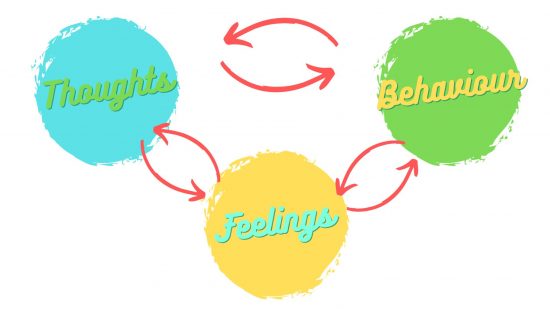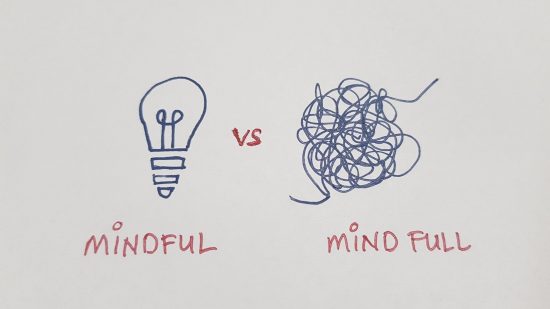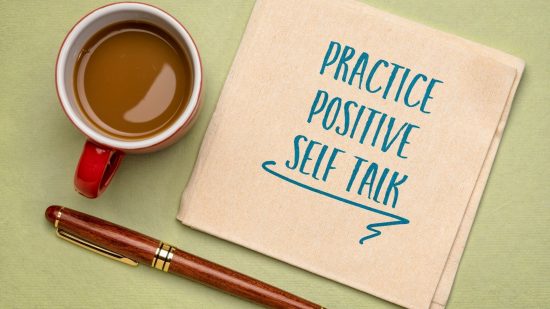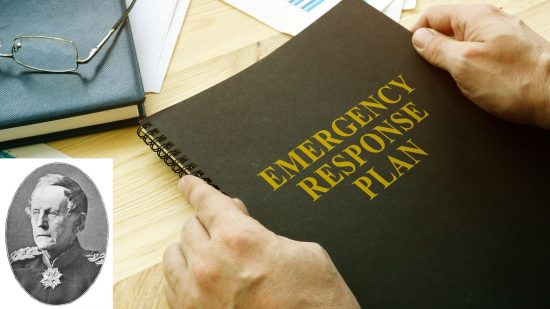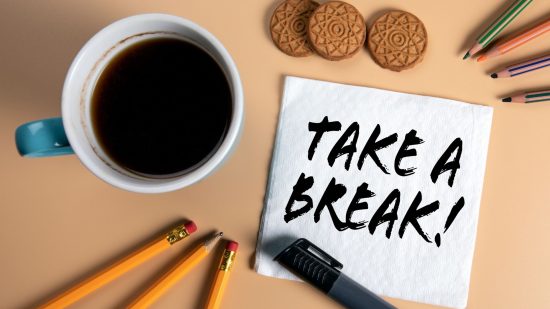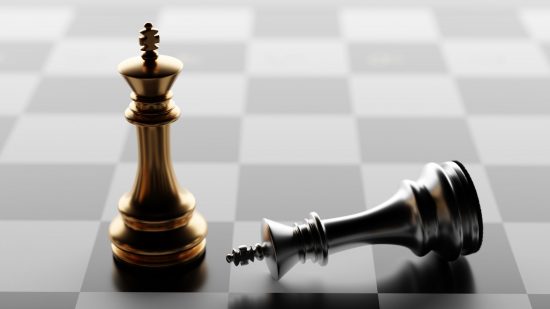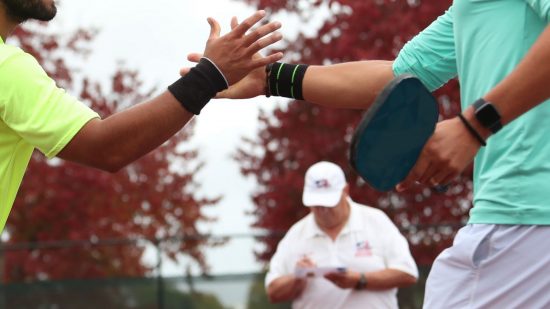Losing is hard. It’s a rare thing to set out to lose (and if losing at Warhammer 40k was your goal, games would pass by very quickly!). But learning how to lose, how to be graceful in defeat, and how to grow as a person out of loss is an essential part of not just sport, but life itself. The better we manage loss, the more fun we are to play against, and our community becomes a little less toxic at the same time.
My name’s Dr Joe, Wargamer’s resident psychiatrist, and today we’re going to talk about how to become a better loser using psychotherapy.
We’re going to use the model for Cognitive Behavioural Therapy for this one. At its core is a simple concept – our thoughts, feelings and behaviours all interact with each other, and through changing our thoughts and behaviours, we can start to feel better. Let’s talk through these at each stage of a Warhammer 40k match.
Before the Game
Coping with losing is not just about after the loss – preparation, as in all things, is key.
- Thoughts
- Feelings
- Behaviors
1. Thoughts
Understand your expectations
It might sound obvious, but the first step is to accept losing is a realistic possibility. At its core, we’re playing a dice game, and Tzeentch – er, sorry, ‘chance’ – cares not for our desires. We can’t set out assuming victory is the only option – remember, you are not an Ultramarine in a Matt Ward story (sorry Matt).
Plan for the worst
No great general won wars assuming invincibility. From Sun Tzu to Napoleon and beyond, they knew victory comes through preparing for misfortune. Your tactical planning will go better when you consider how you’ll act if your favourite tank detonates spectacularly in the opening barrage of turn 1.
Set goals other than victory
This is less tactical and more for your wellbeing. Consider not actually setting ‘Winning the Game’ as your success condition. Don’t set yourself up to consider a loss a complete failure. If you set out a more narrative goal, or even just to have a great time with a friend, the loss becomes part of the story, rather than being the only story.
2. Feelings
Manage your anxiety and excitement
Nerves are a bit like fire – a tiny bit is good, useful, focusing. Too much? Your house burns down. Lean into the mild nerves, but if they become overwhelming, there are ways to manage this in the next tip.
Practise mindfulness techniques
This is something that should come long before a game. They’re a skill, one that needs practice, but one that’s well worth having in your arsenal to calm yourself in a crisis. Why not download Headspace and give it a go?
3. Behaviors
Prepare calmly, in good time
Get yourself ready in advance, so that you’re not worrying about where your dice and rulebooks are when you want to focus on deployment! It’s a small thing, but it’ll help reduce that sense of overwhelm.
Engage positively with your opponent
I promise you, the player over the table is not a Genestealer Cults agent in disguise. This is supposed to be fun! If you don’t know your opponent, get to know them. Be friendly and talk to them, don’t create an aggressive sense of competition.
Nobody wants to be ‘That Guy’, and by chatting openly pre-game you’ll be hard pressed to find someone who’d describe you as one. Who knows, you might even like them enough to find genuine joy in their success if they win!
During the Game
- Thoughts
- Feelings
- Behaviors
1. Thoughts
Practise adaptive thinking
As the old military saying goes, “No plan survives first contact with the enemy”. This from Field Marshal Helmuth Karl Bernhard Graf von Moltke the Elder (a rather fantastic name), a 19th Century commander who emphasised planning for all possible outcomes and having flexibility in tactics. While he never played Warhammer, I’m pretty sure he’d advise this: your plan falling apart in turn one is normal! Have a backup.
Maintain perspective
Remember, you’re there to have fun. Even when facing defeat, this remains, at its heart, a game of toy soldiers – victory is not all that matters!
2. Feelings
Regulate your emotions with breathing
We mentioned mindfulness earlier, and having practised that will come in handy. Still struggling with frustration? Try ‘Square Breathing’. Visualize a square in front of you, each side four seconds long, and follow the sides around in a loop.
As you go across the top, breath in over four seconds, as you go down one side, hold in the breath for four seconds, across the bottom, breath out over four seconds, as you go up the other side, hold your lungs empty for four seconds. Repeat this, and find that control coming back!
Enjoy the process
Any moment of joy or excitement – seize it! Even if that’s a particularly impressive roll by your opponent, revel in it.
3. Behaviors
Keep up friendly interaction with your opponent
Sportsmanship is key. You’ve already started being chatty with your opponent – don’t stop! Keep it going, because it keeps the game fun for everyone – and you could make lasting friends over the tabletop.
Taking breaks
Unless you’re at an intense tournament with chess clocks, there’s no issue with asking for a five minute pause (or longer). If you’re struggling, or just not having fun, feel free to walk away for a bit and find some space.
After the Game
- Thoughts
- Feelings
- Behaviors
1. Thoughts
Think reflectively and dispassionately
When you play back the game, try to stay objective; one way to do this is to initially lay down events as a series of facts. Don’t add emotion or judgement to them, just replay the events. Remember: a loss is not a reflection on you as a person; sometimes it just happens.
Give yourself positive reinforcement
Now spend some time thinking about the great moments. Any heroic charges? Were there valiant stands at that last objective? Don’t just include your own moves here, either; the more you practise enjoying your opponents brilliant moves, the more fun you’ll have in every game (and the more fun you’ll be to play against).
2. Feelings
Process your disappointment
It is absolutely OK to feel disappointed at a loss; what matters is how we process that. A simple way might be to reframe it – not that it was your failure, but that it was great gameplay by your opponent. Once you’ve taken time to acknowledge any negative feelings, remind yourself they’re a normal reaction, that they don’t define you, and look to the next game.
3. Behaviors
Maintain positive post-game rituals
Congratulate your opponent! Remember, we’re a community, and just as we want to be able to enjoy our own victories, we need to enable our friends to enjoy theirs. Grace in defeat is a strong antidote for toxicity, and this will help you focus on the great moments in the game, whoever they came from!
Engage with your community
Talk openly about the game, share those frustrations and the glories! Literally every player (no matter their Warhammer 40k faction of choice) has been where you are right now, and felt similarly to you. Shared perspective can help to stop us focusing too much on the negatives.
So, that’s your whirlwind tour of CBT techniques to cope with losing. Remember the core tips, that we play to have fun, not to win, and that being graceful in defeat makes you a great opponent – as well as helping the Warhammer community become even more welcoming.
I try and use these myself, and I don’t think my gaming group will ever quite forget the (excited!) noise I made when an Imperial Knight Castellan of mine was spectacularly detonated by a lucky bolt pistol shot. Seize the joy in those losses, because they’re all part of the same thrilling story.
Do these work for you? Or do you have any great tips you want to share? Get in touch, and spread the word!
If you got something useful out of this article, check out my other psychology-informed Wargamer features! Here’s why DnD therapy works; I’ve also written about why Warhammer fans hate change (and also things staying the same). And, if you’re struggling with your pile of shame, here are my tips to beat Warhammer hobby burnout.
On that last front, Wargamer’s guides to painting miniatures, the best paints for miniatures, and the best speed-painting contrast paints might also be helpful.
Source: Wargamer



